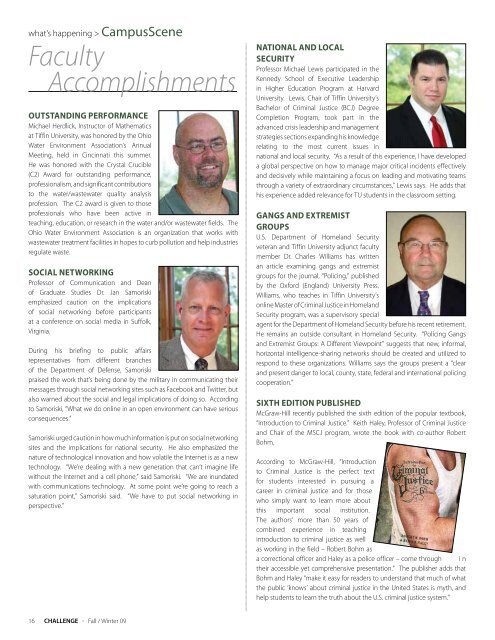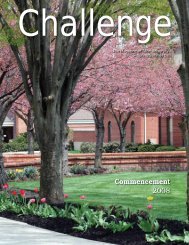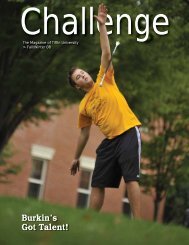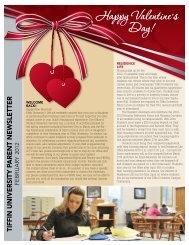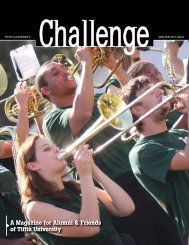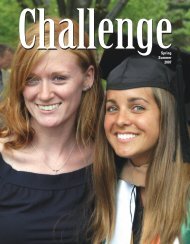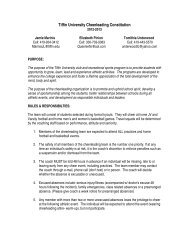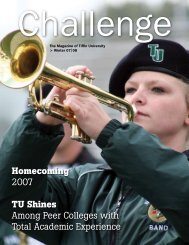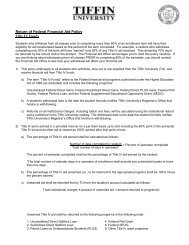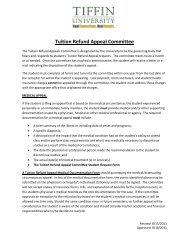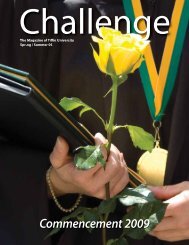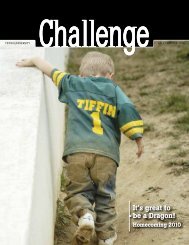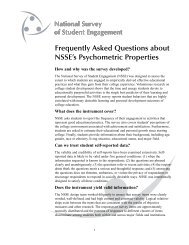Enrollment Increases 128% In Six Years - Tiffin University
Enrollment Increases 128% In Six Years - Tiffin University
Enrollment Increases 128% In Six Years - Tiffin University
Create successful ePaper yourself
Turn your PDF publications into a flip-book with our unique Google optimized e-Paper software.
what’s happening > CampusScene<br />
Faculty<br />
Accomplishments<br />
OuTSTaNDINg pERFORMaNCE<br />
Michael Herdlick, <strong>In</strong>structor of Mathematics<br />
at <strong>Tiffin</strong> <strong>University</strong>, was honored by the Ohio<br />
Water Environment Association’s Annual<br />
Meeting, held in Cincinnati this summer.<br />
He was honored with the Crystal Crucible<br />
(C2) Award for outstanding performance,<br />
professionalism, and significant contributions<br />
to the water/wastewater quality analysis<br />
profession. The C2 award is given to those<br />
professionals who have been active in<br />
teaching, education, or research in the water and/or wastewater fields. The<br />
Ohio Water Environment Association is an organization that works with<br />
wastewater treatment facilities in hopes to curb pollution and help industries<br />
regulate waste.<br />
SOCIal NETwORkINg<br />
Professor of Communication and Dean<br />
of Graduate Studies Dr. Jan Samoriski<br />
emphasized caution on the implications<br />
of social networking before participants<br />
at a conference on social media in Suffolk,<br />
Virginia.<br />
During his briefing to public affairs<br />
representatives from different branches<br />
of the Department of Defense, Samoriski<br />
praised the work that’s being done by the military in communicating their<br />
messages through social networking sites such as Facebook and Twitter, but<br />
also warned about the social and legal implications of doing so. According<br />
to Samoriski, “What we do online in an open environment can have serious<br />
consequences.”<br />
Samoriski urged caution in how much information is put on social networking<br />
sites and the implications for national security. He also emphasized the<br />
nature of technological innovation and how volatile the <strong>In</strong>ternet is as a new<br />
technology. “We’re dealing with a new generation that can’t imagine life<br />
without the <strong>In</strong>ternet and a cell phone,” said Samoriski. “We are inundated<br />
with communications technology. At some point we’re going to reach a<br />
saturation point,” Samoriski said. “We have to put social networking in<br />
perspective.”<br />
16 CHALLENGE > Fall / Winter 09<br />
NaTIONal aND lOCal<br />
SECuRITY<br />
Professor Michael Lewis participated in the<br />
Kennedy School of Executive Leadership<br />
in Higher Education Program at Harvard<br />
<strong>University</strong>. Lewis, Chair of <strong>Tiffin</strong> <strong>University</strong>’s<br />
Bachelor of Criminal Justice (BCJ) Degree<br />
Completion Program, took part in the<br />
advanced crisis leadership and management<br />
strategies sections expanding his knowledge<br />
relating to the most current issues in<br />
national and local security. “As a result of this experience, I have developed<br />
a global perspective on how to manage major critical incidents effectively<br />
and decisively while maintaining a focus on leading and motivating teams<br />
through a variety of extraordinary circumstances,” Lewis says. He adds that<br />
his experience added relevance for TU students in the classroom setting.<br />
gaNgS aND ExTREMIST<br />
gROupS<br />
U.S. Department of Homeland Security<br />
veteran and <strong>Tiffin</strong> <strong>University</strong> adjunct faculty<br />
member Dr. Charles Williams has written<br />
an article examining gangs and extremist<br />
groups for the journal, “Policing,” published<br />
by the Oxford (England) <strong>University</strong> Press.<br />
Williams, who teaches in <strong>Tiffin</strong> <strong>University</strong>’s<br />
online Master of Criminal Justice in Homeland<br />
Security program, was a supervisory special<br />
agent for the Department of Homeland Security before his recent retirement.<br />
He remains an outside consultant in Homeland Security. “Policing Gangs<br />
and Extremist Groups: A Different Viewpoint” suggests that new, informal,<br />
horizontal intelligence-sharing networks should be created and utilized to<br />
respond to these organizations. Williams says the groups present a “clear<br />
and present danger to local, county, state, federal and international policing<br />
cooperation.”<br />
SIxTH EDITION puBlISHED<br />
McGraw-Hill recently published the sixth edition of the popular textbook,<br />
“<strong>In</strong>troduction to Criminal Justice.” Keith Haley, Professor of Criminal Justice<br />
and Chair of the MSCJ program, wrote the book with co-author Robert<br />
Bohm.<br />
According to McGraw-Hill, “<strong>In</strong>troduction<br />
to Criminal Justice is the perfect text<br />
for students interested in pursuing a<br />
career in criminal justice and for those<br />
who simply want to learn more about<br />
this important social institution.<br />
The authors’ more than 50 years of<br />
combined experience in teaching<br />
introduction to criminal justice as well<br />
as working in the field – Robert Bohm as<br />
a correctional officer and Haley as a police officer – come through i n<br />
their accessible yet comprehensive presentation.” The publisher adds that<br />
Bohm and Haley “make it easy for readers to understand that much of what<br />
the public ‘knows’ about criminal justice in the United States is myth, and<br />
help students to learn the truth about the U.S. criminal justice system.”


